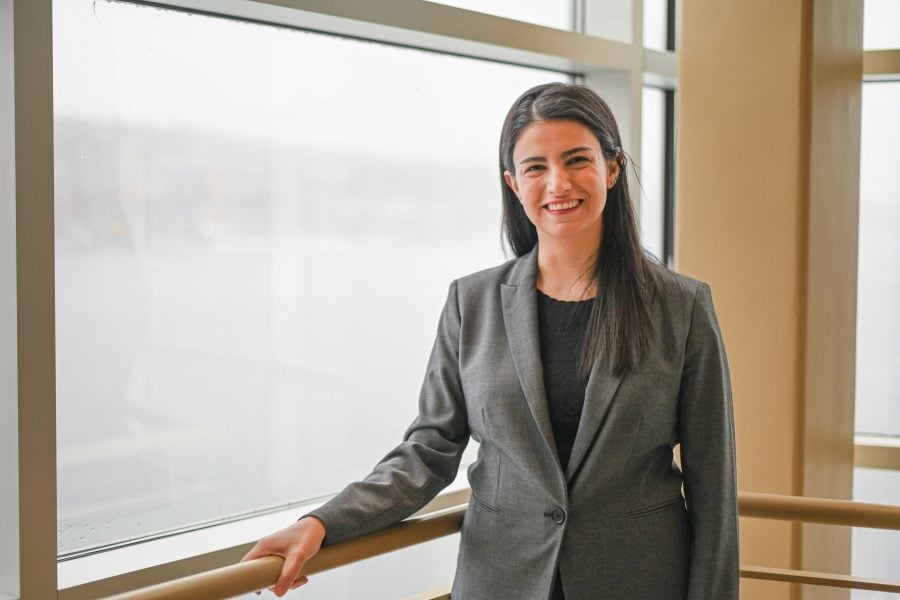
For her student-centric approach to teaching, College of Engineering Dean Michelle Scherer has selected Hoda Hatoum, assistant professor in the Department of Biomedical Engineering and assistant affiliated professor in the Department of Mechanical and Aerospace Engineering, as the final instructor in this year’s Deans’ Teaching Showcase.
Hatoum will be recognized at an end-of-term event with other spring showcase members and is a candidate for the CTL Instructional Award Series.
Hatoum’s courses go beyond traditional lectures. She incorporates interactive and real-world applications that encourage students to think critically while applying their learning in meaningful ways. Her teaching strategies rely on hands-on activities that make abstract concepts more tangible and understandable, and help students’ understanding and the retention of the material.
A good example is in Hatoum’s biomechanics courses, when students engage in interactive case studies where they “play cardiologist.” In the activity, they apply fundamental fluid dynamics principles to assess a patient’s echocardiographic findings, make a diagnosis and simulate clinical decision-making. Another example is when she brings springs, rubber bands, syringes filled with viscous fluids, and slime into her classroom in order to make the concepts of constitutive modeling—a topic many students struggle to understand—less abstract and more understandable.
Recognizing that students benefit from a variety of learning approaches, Hatoum uses flipped-classroom techniques for mathematically intensive sections. By allowing students to review foundational material she shares before class, she maximizes in-class time for a quick recap, active problem-solving, and discussion. She has also integrated generative artificial intelligence (GenAI) into her teaching, encouraging students to critically evaluate AI-generated responses as they develop digital literacy skills.
Hatoum is particularly committed to fostering inclusiveness in engineering education. She ensures that her courses highlight the diversity of physiological and anatomical considerations in medical device design, for example. Students explore how traditional engineering solutions, such as scaling down a medical device, may not be universally effective, particularly for pediatric and female patients.
Student feedback underscores Hatoum’s impact on their learning experiences. Referencing a class session based on case studies, one student noted, “We thought the lecture was informative and interesting while also helping us learn. Dr. Hatoum did a great job!” Another student praised her active learning strategies: “Study sessions are awesome, and the note sheet before exams encourages reflection and is super helpful. Dr. Hatoum is a great teacher who really cares about her students. Keep up the good work!”
In addition to her innovative classroom methods, Hatoum has been a mentor for several undergraduate student researchers. She has guided students in research projects that have resulted in multiple conference presentations, publications, internship opportunities based on the research performed, and external and institutional fellowship and scholarship awards. Many of her mentees have gone on to pursue graduate studies or industry roles. They credit Hatoum with helping them develop strong profiles and problem-solving skills.
“I really appreciate Hoda’s use of multiple strategies to engage students,” said Scherer. “It allows her to reach all her students, helping them to develop into independent thinkers who will make meaningful contributions to society.”
About the College of Engineering
Michigan Tech’s College of Engineering offers more than 15 bachelor of science degrees in biomedical engineering, chemical engineering, civil, environmental and geospatial engineering, electrical and computer engineering, engineering fundamentals, geological and mining engineering and sciences, manufacturing and mechanical engineering and technology, materials science and engineering, and mechanical and aerospace engineering.
Our engineering graduate degree options include master’s and PhD programs, along with robust online certificate programs for busy professionals. Follow Michigan Tech Engineering on Facebook, Instagram, LinkedIn, and Twitter for the latest happenings.